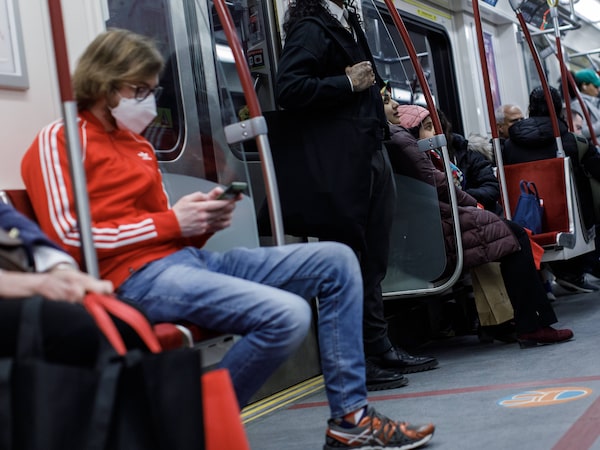
Riders take a subway train on the Toronto Transit Commission station in downtown Toronto, Saturday, April 1, 2023. Canada's industry minister is calling on the country's biggest telecom companies to come to an agreement over wireless service in Toronto's subway system. THE CANADIAN PRESS/Cole BurstonCole Burston/The Canadian Press
Rogers Communications Inc. RCI-B-T says there is no reason for the CRTC to intervene in the company’s escalating dispute with BCE Inc. over access to the Rogers-owned wireless network on Toronto’s subway system.
In its response to an application filed with the regulator last month by BCE, the parent of Bell Canada, Rogers argues that access to the infrastructure inside Toronto Transit Commission subway tunnels is a commercial matter between Rogers, Bell and the other wireless carriers.
BCE BCE-T is asking the CRTC to issue a series of urgent orders, including one prohibiting Rogers from onboarding its own customers onto the network until it is able to provide access to all wireless carriers.
The Montreal-based telecom has argued that Rogers is attempting to gain a commercial advantage by delaying access for non-Rogers customers for as long as possible.
However, Toronto-based Rogers argues that there is no basis in the Telecommunications Act “or in any Commission instrument” for the CRTC to issue the orders BCE is seeking.
“Commission intervention in the manner proposed by Bell in what are ordinary course contractual and technical discussions among sophisticated parties is inappropriate, unprecedented, and simply unnecessary in the present circumstances,” reads the submission from Dean Shaikh, Rogers’ senior vice-president of regulatory affairs.
The application before the CRTC is the latest development in a months-long dispute between Rogers and two of its rivals – BCE and Telus Corp. T-T – over wireless service on the subway system in Canada’s most populous city.
The conflict began after Rogers announced in April that it had struck a deal to acquire BAI Canada Inc., the Canadian branch of an Australian telecommunications infrastructure company with the sole right to develop wireless infrastructure inside the TTC subway system.
The issue has captured widespread attention after a string of violent attacks on the TTC, which sparked calls for carriers to offer cellphone service inside the tunnels as a safety measure.
Currently, only customers of Freedom Mobile, the wireless carrier recently acquired by Quebecor Inc., have access to wireless services on the subway, although all riders can make 911 calls. However, the network only covers station platforms, concourses and about a quarter of the tunnels. Rogers has committed to modernizing and expanding the network, noting that the current legacy network is unable to handle customer traffic from the three major carriers.
BCE has claimed that Rogers is refusing to engage in negotiations and that unless the CRTC intervenes, it will likely be years before most Canadians have access to wireless services on the subway. Telus has filed a submission in support of Bell’s application, arguing that “Rogers’ actions constitute unjust discrimination against other carriers.”
In its response, Rogers says there is “no foundation for Bell’s claims” that Rogers is deliberately attempting to delay access. The telecom says it has committed to onboarding other carriers, proposed a framework for negotiations, and “invited each of Bell, Telus and Quebecor to formally commence negotiations.”
The framework Rogers has suggested would see it enter into arbitration with BCE, Telus and Quebecor QBR-B-T if it is unable to reach commercial agreements with at least one of those carriers by Aug. 15.
Under the model Rogers has proposed, the other three carriers would pay fees to access the TTC infrastructure. Rogers says it has sent the companies its proposed terms.
In contrast, Bell and Telus have been advocating for a joint build model, in which all carriers would own a stake in the network. They argue that such a model would improve the reliability of the network and reduce congestion.
Bell and Telus have also asked federal Industry Minister François-Philippe Champagne to help them secure a commitment from Rogers that their customers will be allowed onto the network concurrently with Rogers customers.
A spokesperson for Mr. Champagne previously said the minister is closely monitoring the negotiations between the companies and will take further action if necessary.
A consortium of 10 civil society organizations, including TTCriders, a group that represents the subway system’s riders, is calling on the CRTC to ensure that Rogers does not delay access for other carriers.
“All transit users need access to cellular service, regardless of who their provider is,” reads their submission to the CRTC.